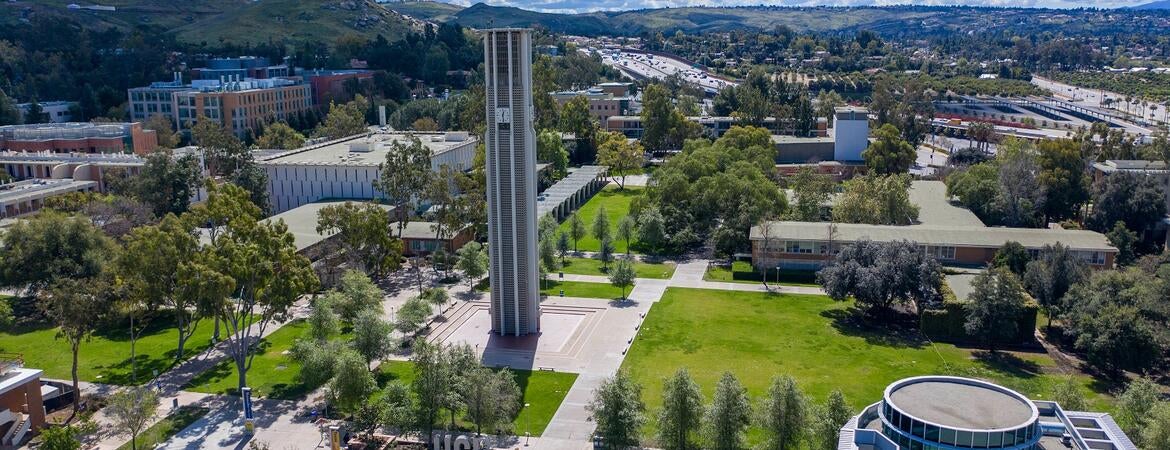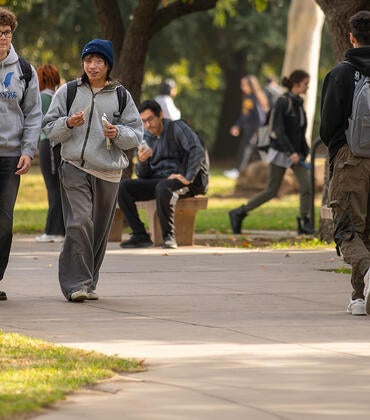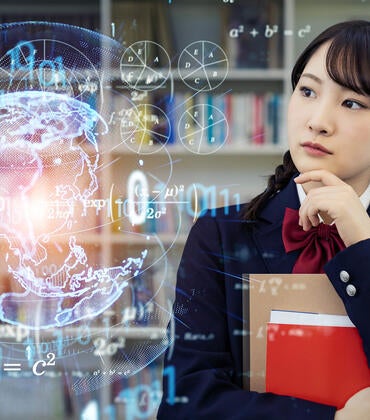UCR's Office of Research and Economic Development (RED) has announced over $1.7 million in competitive funding for faculty research projects through its Opportunity to Advance Sustainability Innovation and Social Inclusion initiative, known as OASIS. The projects range from probing the severity of COVID-19 infection in Riverside County, through sustainability and resilience in agriculture; to finding ways to mine lithium needed for electric car batteries from brine below the Salton Sea.
These seed grants enable UCR faculty to initiate, continue, or expand research, scholarly and creative activities in areas under the OASIS umbrella, and increase their competitiveness for outside funding. RED will launch the second round of competitive internal funding in the next few months. Numerous proposals were received from faculty during the initial solicitation. Here are brief summaries of the winning projects:
$200,000 awards:
COVID-19 severity in Hispanic/Latinx communities
Meera Nair (biomedical sciences), Erica Heinrich (biomedical sciences), Richard Carpiano (public policy), Susan Hackwood (electrical & computer engineering) will investigate acute COVID-19 infections and long COVID in the Hispanic/Latinx communities of Riverside County. The project will recruit participants with active COVID infections to determine if COVID disease is more severe in their communities. The study will also measure whether participants who have recovered from COVID will experience long-term effects on their lung and immune health and determine if they have higher risk for and severity of such long-term effects. The study will also gather feedback from participants, community leaders, and policymakers through ongoing dialogues, conferences, and workshops.
Using warehouse space for charging stations
Matthew Barth (research and graduate education and electrical and computer engineering), Kanok Boriboonsomsin (CE-CERT), Marissa Brookes (political science), Juliann Emmons Allison (gender & sexuality studies), and Catherine Gudis (history) will examine the conversion of underutilized warehouse space into public charging stations to accelerate replacement of polluting diesel trucks with electric trucks. Truck operators could save time charging their trucks while picking up or delivering loads while warehouse owners would benefit from a new revenue source. The project comes as the Inland Empire has quickly become one of the nation’s largest logistics hubs, with over a billion square feet of warehouse space that attracts many diesel trucks that emit toxic soot.
Photochemical treatment of recycled water for agriculture
Haizhou Liu (chemical and environmental sciences) and Amir Haghverdi (agricultural and urban water management) will test a novel photochemical treatment of recycled water needed to irrigate urban farms. This project aims to improve agriculture sustainability and agro-urban ecosystem health by treating wastewater with deep ultraviolet light so it can be used to safely irrigate crops. The project will conduct field trials to evaluate downstream risks. This technology could significantly impact natural resource management, sustainability, innovation, social inclusion, education, and workforce development.
Identifying steps for lithium recovery and manufacturing by the Salton Sea
Arun Raju (CE-CERT), Juchen Guo (chemical & environmental engineering), Alfredo Martinez-Morales (CE-CERT), Wilfred Elders (earth and planetary sciences), Vincent Lavallo (chemistry), Timothy Lyons (earth and planetary sciences), Michael McKibben (earth and planetary sciences), and Kurt Schwabe (public policy) will identify the steps needed to develop an earth-friendly manufacturing hub that takes advantage of renewable electricity and lithium resources in the Salton Sea Geothermal Field. The field contains the world’s largest known undeveloped brine reserve of lithium needed for electric car batteries. The hub would have research and manufacturing facilities for lithium recovery and refining, battery technologies, geothermal power, community heating and cooling services, and hydrogen production. It would have broader economic development, and workforce training and education components. Lithium is an essential component of the batteries in electric cars. The World Bank estimates that global lithium production will need to increase by 500% by 2050 to meet the demands of the clean energy and transportation sectors.
Assessing precision agriculture techniques to bolster long-term sustainability
Elia Scudiero (environmental sciences) and Konstantinos Karydis (electrical and computer engineering) to investigate Southern California-based research and workforce development in precision agriculture that can bolster long-term sustainability and resilience of agriculture in the region despite the increasing scarcity of water, land, and other natural resources. Throughout the project, newly developed software will analyze real-time orchard data, test portable sensors for mapping soil moisture, and collect high-resolution images to track environmental factors influencing crop yields. The sensor data will provide for real-time diagnostics of potential problems in the field to allow for preemptive remedies. The project also will provide undergraduate students with mentorship and training on agricultural technologies and entrepreneurship.
Fostering innovation and minority entrepreneurship in the Inland Empire
Qingfang Wang (public policy) and Elaine Wong (management) will examine the role of higher education institutions in fostering entrepreneurship and innovation in the Inland Empire and the role universities play in addressing disparities and inequality across ethnic and gender groups. The project aims to show how inclusive entrepreneurship ecosystems could unleash the power of minority entrepreneurship and challenge current urban system regimes. Data will be collected from UCR entrepreneurship education programs and community stakeholders through surveys, interviews, and focus groups. A case study will be conducted by examining UCR’s “entrepreneurial talent pipeline development” project.
$25,000 awards:
AGRICULTURE TECHNOLOGY AND FOOD SECURITY:
• A Portable Nucleic Acid Extraction and Collection Device for Citrus Disease Diagnosis: Hideaki Tsutsui (mechanical engineering) and Sohrab Bodaghi (microbiology and plant pathology)
• Proof-of-Concept Development of a Soft Continuum Robot for Harvesting inside the Tree Canopy: Jun Sheng (mechanical engineering)
• Identifying Genotype-Environment Associations in Wild Sunflowers of the Inland Empire: Kate Ostevik (evolution, ecology, and organismal biology)
COMMUNITY HEALTH AND HEALTH DISPARITY:
• Spanish for the Health Professions: A Community-Engaged Tutorial Program: Lamar Prieto (Hispanic studies) Álvaro González Alva (Hispanic studies) and Martina Visconti (Hispanic studies)
• Longitudinal Causal Decomposition Analysis: Identifying Robust Factors Contributing to Health Disparities: Soojin Park (educational psychology) and Chioun Lee (sociology)
• Relationship Between Opioid Overdose Deaths and Licensed Cannabis Dispensary Density in California's Coachella Valley: Christopher Fichtner (psychiatry and neuroscience), Jennifer Syvertsen (anthropology), Mark Wolfson (social medicine, population, and public health), Kendrick Davis (psychiatry and neuroscience), and Howard Moss (psychiatry and neuroscience)
HUMAN DEVELOPMENT
• Beyond Parental Rejection: How Does Non-Parental Relatives’ Support Impact the Housing Stability and Safety of LGBTQ Youth?: Brandon Robinson (gender and sexuality studies)
• Sound OASIS: An Inclusive Future for Music Tech: Liz Przybylski (music)
• Science to Policy OASIS Fellowships for the Inland Empire: Susan Hackwood (electrical and computer engineering) and Shaun Bowler (graduate division)
NATURAL RESOURCE MANAGEMENT
• Heated Experiences: Building Climate Resiliency in Inland Southern California: Chikako Takeshita (gender and sexuality studies)
• Development of the Advanced PFAS Degradation Technology: Filling the Last Gap from Practical Application and Technology Commercialization: Jinyong Liu (chemical and environmental engineering)
• Improving Agricultural Water Use Efficiency by Evapotranspiration Partitioning Using In-Situ and Modeling Approaches: Hoori Ajami (environmental sciences) and Ray Anderson (environmental sciences)
• Ultrasensitive Radiocarbon Detection for Atmospheric Monitoring of Fossil Emission and Biomedical Applications: Jingsong Zhang (chemistry)
• Identification of Defluorinating Biocatalysts for Cost-Effective Treatment of Per- and Polyfluoroalkyl Substances: Yujie Men (chemical and environmental engineering)
RENEWABLE ENERGY AND FUELS
• Single Crystal Growth of Solid Electrolytes for All-Solid-State Lithium-Ion Batteries: Xi Chen (electrical and computer engineering)
• Wildfire Mitigation by Intelligent and Automated Monitoring of Incipient Failures in Power System Apparatus: Hamed Mohsenian-Rad (electrical and computer engineering)
• How Can Biological Inspiration from Red Wine Make Inverted Dye-Sensitized Solar Cells Work Well?: Valentine Vullev (bioengineering) and Gregory Beran (chemistry)
SUSTAINABLE TRANSPORTATION AND INFRASTRUCTURE
• New Statistical Models to Handle Abnormal and Heterogeneous Data in Smart Cities and Renewable Energy Applications: Weixin Yao (statistics)
• Sustainable AI for Wireless Internet-of-Thing: Basak Guler (electrical and computer engineering)
• Strategic Planning for the Electrification of Heavy-Duty Drayage Trucks: Ran Wei (public policy)




